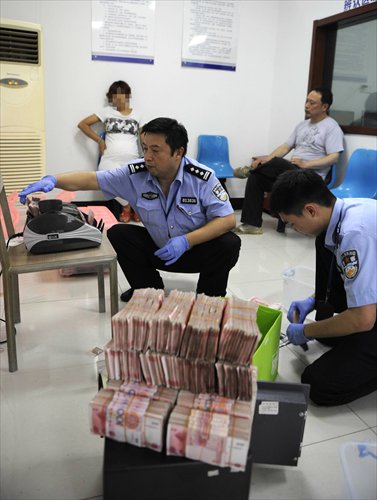HOME >> CHINA
Female criminals evade jail time for being mothers
Source:Xinhua Published: 2016-1-10 19:23:01

Police in Nanjing, Jiangsu Province, collect the illegal gains of Zhi Hui after arresting her in June, 2014. Photo: CFP
Zhi Hui, 35, became an unlikely mascot for women dealing drugs in Nanjing, Jiangsu Province, after evading a jail sentence five times on the grounds that she is a mother.Zhi, a single mother of three, was pregnant with her oldest son when she was first caught in 2011 for possession of 150 grams of meth and heroin.
"The police said I could post bail and stay at home. Then after a year, I accidentally became pregnant again. I needed to make money to raise my children, so I had a third baby to stay away from jail and sustain my drug business," Zhi said in an exclusive interview with the Xinhua News Agency.
Among Nanjing's drug dealers, Zhi is well known and has earned the nickname "Sister Hui." "Several major drug dealers confessed that they have encouraged their female friends to learn from Zhi - to have babies to avoid jail," said Wei Yuqing, a police officer in Gulou district in Nanjing.
Chinese Criminal Law stipulates that women who are pregnant or breast-feeding may post bail instead of serving a jail sentence on humanitarian grounds. Though the law also says repeat offenders will be arrested and imprisoned, police are reluctant to send mothers to jail due to lack of adequate social services for their children.
"The humanitarian leeway has been used by drug traffickers as a loophole. They use their own children to defy legal punishment," said Ji Shengzhi, director of the anti-drug police squad in Nanjing.
Dangerous precedent
After noting Zhi's success in evading police, other female drug dealers in the eastern metropolis have followed in her footsteps.
In 2014, eight drug-dealing mothers were arrested and 25.9 kilograms of drugs were confiscated. Zhi was released on bail five times after being caught by police between 2011 and 2015.
"Zhi was required to report to her community during bail, but she made efforts to skirt monitoring and expand her drug business," said Wei.
Shielded by her motherhood status, she became a drug empress. Out of 100 kilograms of drugs seized every year, Zhi's business accounted for about one fifth, Wei said.
But in March 2015, she was caught carrying 15.7 kilograms of meth and heroin, and is awaiting sentencing for jail time.
"These drug-dealing moms must be punished. Otherwise, more people will follow suit," said Ji.
Call for better social service
A nationwide regulation put in place to provide better social services for the children of offenders in January 2015 may have paved the way for Zhi's eventual incarceration. Under the policy, drug addicts, traffickers, gamblers, sex offenders and child abusers will be stripped of guardianship. Civil affairs departments are required to establish institutions to take interim custody of the children and find foster families for them.
However, the work has been impeded by a lack of venues and shortage of funds and manpower. In Qinhuai district of Nanjing, several children whose parents were stripped of guardianship were forced to live in senior care centers.
Nanjing has asked its community social service centers to provide help for minors who are vagrants, beggars, left-behind, victims of abuse and in similar situations, said Zhou Xinhua, director of the social service of the Nanjing Civil Affairs Bureau.
Though these organizations provide short-term help for the children, they have difficulty keeping them for an extended period of time, he said.
Zhu Hong, director of the Nanjing Orphanage, said several children whose parents are in jail are staying in the orphanage.
"But there are many challenges. For example, children like Zhi's have separate household registration permits, or hukou, which mean they can only attend certain schools, far away from the orphanage," said Zhu.
Newspaper headline: Drug-dealing moms
Posted in: Society